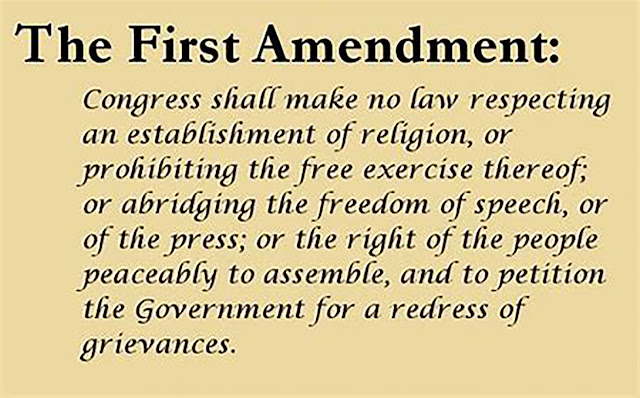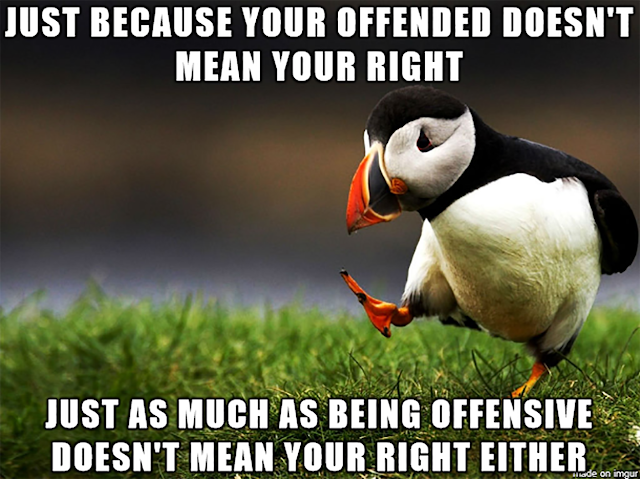Important as the “sages of the ages” may have considered it to be, freedom of the press is under attack in the first quarter of the 21st Century. Many economic problems have beset our news media. Local newspapers have taken the hardest blows.
The business model that profitably supported newspapers and what we now consider “traditional” broadcast news media for decades has eroded out from under these organizations in the Age of the Internet.
 |
| (Osama Hajjaj/Cartooning for Peace/Global Geneva) |
Freedom of the press is under attack from social media that draw eyes away from paid news sources, too. News aggregators depend on them, but they also freely borrow from them, reaping the benefit of their paid professional journalists.
 |
| (AZ Quotes) |
This changing landscape drains surviving news agencies drier and drier. The average regional newspaper that still exists has seen its staff of professional journalists dwindle down to a hard-working, multi-tasking few. Efforts such as Report for America (modeled on Teach for America, but a separate entity) can’t fill that gap.
It also has trained people to expect free news. I hear complaints all the time from people who have followed my links to a fuller discussion on a news source, only to face a paywall.
 |
Free news, “echo chambers,” and the rise of fake news
Recent research by Reuters found that most people aren’t willing to pay for news. Those who do pay for a subscription rarely have more than one. And even those willing to pay may suffer “subscription fatigue” from repeatedly being confronted with pleas to pay, wherever they go. Personally, I have at least ten subscriptions—I just tried to count them all and was kinda shocked—but I still get subscription fatigue.
This whole dynamic can lead to a range of problems. We all have heard how divisiveness in politics is exacerbated when people stick to their own echo chambers of information and opinion. Their confirmation bias grows ever more entrenched when they only listen to people who agree with them.
 |
| (AZ Quotes) |
Mistrust of information from the outside, and uneven or sporadic exposure to free news, that may or may not be accurate, poses an existential treat to democracy. Confirmation bias can cause people to avoid information that may make them question their beliefs. Even if it’s true.
This makes them vulnerable to chicanery. Malicious actors or propagandists have learned how to use this mistrust for their own ends. Roosevelt inveighed against “Editorialists who tell downright lies” in the quotation above. But in the Age of the Internet, they don’t even have to identify themselves.
 |
| (AZ Quotes) |
People with no clear reference points and a distrust of established news agencies fall for fake news such as "Pizzagate" (referenced in an earlier post in this series). Or any other malign messages that foreign agents and domestic ideologues decide to package.
 |
| (Antonio Rodriguez/Cartooning for Peace/Global Geneva) |
A misinformed electorate
This is how wild assertions get spread and believed. They can be life-threatening messages, such as the idea that one might cure Covid with an injection of bleach, or that wearing a mask during a pandemic is somehow weak.
Or they may be democracy-threatening, such as the idea that one leader or political party is coming to take away all the guns belonging to members of the other. Or that voting fraud is rampant, so it’s futile to vote, or it’s okay to place burdensome restrictions on voting.
 |
| (AZ Quotes) |
We can't ignore or wish away the fact that freedom of the press is under attack in our world today. Misleading messages and widely-believed falsehoods are the very opposite of what prevails in a functional democracy.
If the United States—indeed, to a great extent if the world—does not soon learn to counter this pernicious trend, we stand to lose all of our freedoms.
 |
| (AZ Quotes) |
IMAGE CREDITS:
Deepest thanks to Global Geneva and Cartooning for Peace, for two images: I also thank Jordanian cartoonist Osama Hajjaj for the unsettling image of the effect of all too many social media/Internet forces on professional journalism, and Mexican cartoonist Antonio Rodriguez, for his “tightrope over fake news” image.
Many thanks to the L.A. Times, photographer Terry Hagz, and owner Jeff vonKaenel and the Sacramento News & Review, for the “Suspending Publication” photo. I’m pleased to discover their demise wasn’t permanent.
And heartfelt gratitude to AZ Quotes, for the assorted quote-images used in this article: For Indian author Arundhati Roy’s analysis of the free market’s influence on free elections, courts and press. For the warning from FDR about false messages in the news, long before the term “fake news” had been coined. For the description of “spin” from Kathleen Hall Jamieson. For the quote from former U.S. Rep. Melissa Bean (D-Ill.) on the importance of an engaged and informed electorate. And for the Barack Obama quote about lies versus the truth (from a speech given in Estonia in 2014).





















